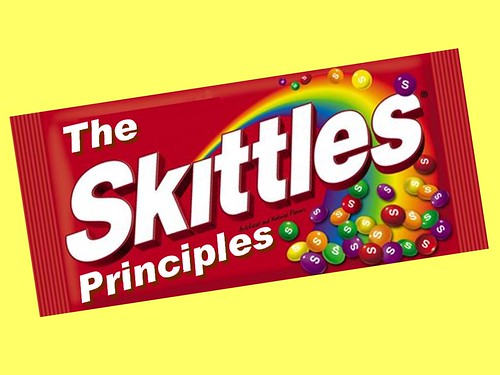 My fellow brothers and sisters in Christ. Please don’t be offended from what I’m about to say. I implore you not to judge me but rather keep an open mind. THIS blog, THIS parable-haven ... is a “safe place”. Okay, here I go. I … LOVE … SKITTLES. There, I said it. Oh and you heard me right. I love Skittles, every bite-sized candy piece is bursting forth with a rainbow of fruit flavor: lemon, lime, orange, strawberry, and grape. You see as a kid growing up I used to like Starburst Fruit Chews. Those were good too. But in today’s go-go-go, feed-me-now society, I just don’t have the time to unwrap each individually wrapped piece of Starburst. With Skittles you get the same mouthwatering fruity taste without all that unwrapping. It’s “candy on-demand”. Just talking about them makes me wish I had some right now. You’re all probably wondering where I’m going with this whole Skittles thing. Well hang on ‘cause we’re not done yet.
My fellow brothers and sisters in Christ. Please don’t be offended from what I’m about to say. I implore you not to judge me but rather keep an open mind. THIS blog, THIS parable-haven ... is a “safe place”. Okay, here I go. I … LOVE … SKITTLES. There, I said it. Oh and you heard me right. I love Skittles, every bite-sized candy piece is bursting forth with a rainbow of fruit flavor: lemon, lime, orange, strawberry, and grape. You see as a kid growing up I used to like Starburst Fruit Chews. Those were good too. But in today’s go-go-go, feed-me-now society, I just don’t have the time to unwrap each individually wrapped piece of Starburst. With Skittles you get the same mouthwatering fruity taste without all that unwrapping. It’s “candy on-demand”. Just talking about them makes me wish I had some right now. You’re all probably wondering where I’m going with this whole Skittles thing. Well hang on ‘cause we’re not done yet.I want to tell you a story and yes it too involves Skittles. When the Disney-Pixar movie “Cars” came out, Kristy and I decided to take Nathan and Brooke to go see it at the dollar theater. I took the afternoon off from work and met the family there. We purchased our tickets and of course we had a bag of Skittles to share. Now Nathan was going through this time in his life where he wanted “his own” of everything … his own bowl of popcorn, his own bag of pretzels, his own box of race cars. So the Skittles were no different. I should have had the foresight to bring individual baggies with the Skittles already disseminated equally. But there were a million others things on our minds just in trying to get out the door on time. At any rate, the movie was starting and Nathan had the bag of Skittles in his possession. I was thinking to myself, when he tries to open the bag there’s a good chance these Skittles are going to explode everywhere, scattered to the four corners of the movie theater. So I asked him, “Nathan, may I have some of your Skittles?” He thought for about a picosecond and then responded, “No, I don’t think so.” Quite a few things flashed through my mind at that point but the following 4 statements about sum them up:
- Doesn’t he know that technically those Skittles are already mine because the money we used to pay for them came from my paycheck?
- Doesn’t he know I could just forcibly take those Skittles away from him? I mean, I’m bigger, I’m certainly stronger and if I wanted to I could reach right over there and disarm him of the Skittles.
- Doesn’t he know that I’m not asking for something that he doesn’t already have in his possession? I mean, the Skittles are right there. There in his lap. I didn’t ask him for some Junior Mints or Jujy Fruits.
- Doesn’t he know how much I love him and that I want to give him 10x the number of Skittles he has right now. I just want him to trust me and have faith to share just a bit of what he currently has in his possession.
When we say that God owns everything, we are acknowledging his rights as creator in accordance with the Scriptures. The Bible says, “The earth is the Lord’s, and everything in it” (Psalm 24:1). Whatever we have has come from the Lord’s hand, and only indirectly by our earning it (1 Chronicles 29:14). Our wealth belongs to us in the same way that the Skittles belonged to my son. The Skittles actually belonged to me, but Nathan was given temporary, accountable charge over it. This is especially the case for Christians, who have been bought at the price of Jesus’ death. Our lives and all our stuff is utterly at the disposal of God who bought us with the blood of His Son. Which brings us to the second Skittles Principle …
Skittles Principle #2
I’m sure we are all pretty familiar with the Old Testament story of Job. In case you’re a little foggy on the details, I’ll give you the Cliffs Notes version. Job had everything going for him. He was a very affluent man in his day. In fact, if Job lived in modern times I’m sure we’d see his 6,000 sq. ft. tent on MTV Cribs and perhaps his camel driver on ‘Pimp My Ride’. But God allowed Satan to take everything from Job: first his property, next his family, then his health. But despite all of this hardship Job still refused to curse God. He makes a powerful realization that everything is God’s. He declared, “the LORD giveth and the LORD taketh away; may the name of the LORD be praised” (Job 1:21). Which leads me to the third principle …Skittles Principle #3
There have been times in my life where I have been afraid … afraid that if I lost my job I wouldn’t have the money to be able to take care of my family (and as a bread winner, that’s important to me) … afraid that I wouldn’t have the money to enjoy simple pleasures in life like getting a haircut or going to the movies. But I learned that my fear was exposing a lack of faith on my part. After all, if I were to lose my job, I don’t believe that God would expect me to put my family’s well-being in jeopardy by giving at the same level I had previously while employed. But while currently employed and being blessed in that regard, I want to respond positively to God’s request for some Skittles back, “Here you go God. Thank you for blessing me with these Skittles. I know they are all yours anyway.” In 2 Corinthians 9:6 we are instructed to: “Remember this … remember this … Whoever sows sparingly will also reap sparingly, and whoever sows generously will also reap generously.” This is one of those verses that we hear so many times that we may actually forget what it really means. You know I never lived on a farm, but I can still understand the principles of sowing and reaping a crop. It’s simple economics. I can’t possibly think that I’m going to haul in a bountiful harvest if I only sprinkle a couple seeds over here and maybe a few over there. Paul goes on to write in verse 7, “Each man should give what he has decided in his heart to give, not reluctantly or under compulsion, for God loves a cheerful giver.” It doesn’t stipulate 1% or 10% or 100% … whatever a person has decided in their heart to give and most importantly cheerfully. And our fourth and final principle is … Skittles Principle #4
I have no doubt in my mind that God wants to prosper us. In fact, in Malachi 3:10 God makes a promise to faithful givers. He says, “I will open the windows of heaven for you. I will pour out a blessing so great you won’t have enough room to take it in! Try it! Put me to the test.” You know from time to time, I makes bets with my wife, Kristy. But I only bet on sure things … when I am absolutely positive that I’m right. And God is challenging us to do the same thing here. God is a god of his word and He’s just asking us to trust Him. Give faithfully and He will surely bless us. It’s a sure thing, done deal.Let’s get back to the story of Job because I kind of left that hanging back at Skittles Principle #2. This is how the story wraps up … After losing just about everything, God made Job prosperous again but not just as rich as before. God blessed Job with twice as much property, a larger more beautiful family, and he lived out his days healthier than before. Just like Job, God wants to increase our prosperity; He’s just asking for a little faith in Him by giving back.
By now I’m sure you’ve realized that I’m talking about the dreaded topic of Stewardship. (*Duck* - ok, who threw that?) But this shouldn’t be a topic that makes anyone uncomfortable. Remember, this is a parable-haven … THIS is a safe place.
So what does God want us to do with the “Skittles” He has given us? The Bible gives a number of answers to this question, including saving (Proverbs 6:6-8), investing (Matthew 25:14-30), providing for family (Proverbs 13:22), staying out of debt (Proverbs 22:7; Romans 13:8) and more. But the Bible gives special attention to one use in particular: giving. To give (especially to the poor) is equivalent to lending to the Lord (Proverbs 19:17). To give (especially to the poor) is equivalent to investing your money in heaven itself (Luke 12:33). Giving is the fitting response to God’s gift of his Son to us (2 Corinthians 8:7-9). Giving (especially to our enemies) is a way of imitating the redeeming love of God (Luke 6:35).
In the end, each of us will give an account to the Lord for how we handled his stuff in the time we had on earth. Another important reason to give In 2 Corinthians 9:11 it is written that “You will be made rich in every way so that you can be generous on every occasion …” God allows us to prosper so that we in turn can be generous with our stuff in thanksgiving to Him. In 1 Corinthians 16:2 Paul also instructs the church in Corinth, “On the first day of every week [Sunday], each one of you should set aside a sum of money in keeping with his income, saving it up, so that when I come no collections will have to be made.” Now if you ask me that sounds like a plug for the ‘Automatic Monthly Donation Plan’. I’m only kidding. Well half-kidding. I was tired of scrambling to find a pen and my checkbook buried in my briefcase. Anyone who’s ever sat next to my family in services will undoubtedly recall my frantic pleas for a writing implement … “a pen, a pen … my kingdom for a pen.”
Stay the course, finish the race ... AB
(Next Month: The Parable of the New Fence)
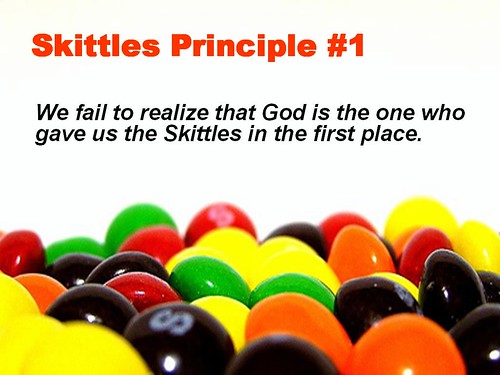
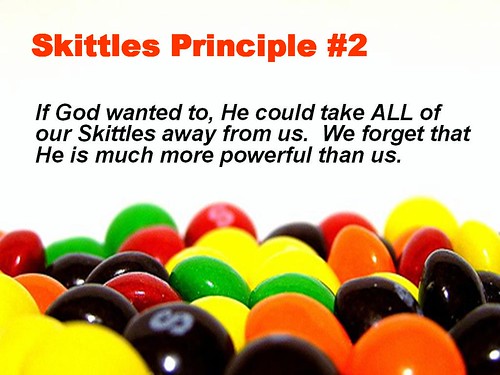
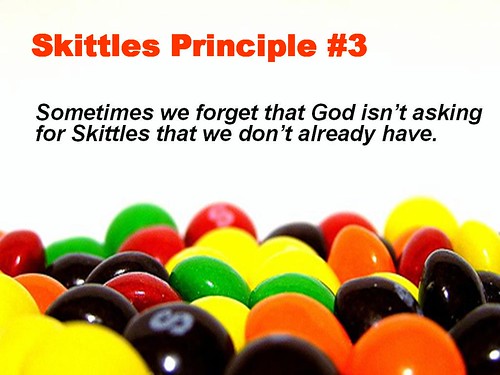
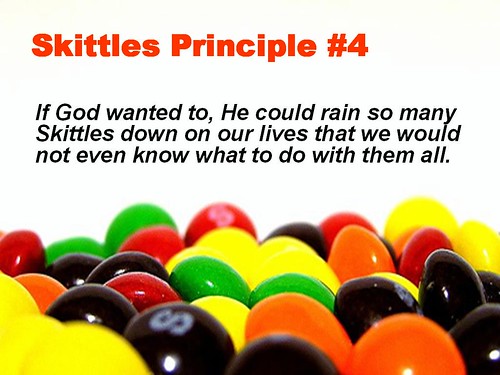






1 comment:
Thanks for that, Aaron! But Gummi Bears are better... :^)
Post a Comment